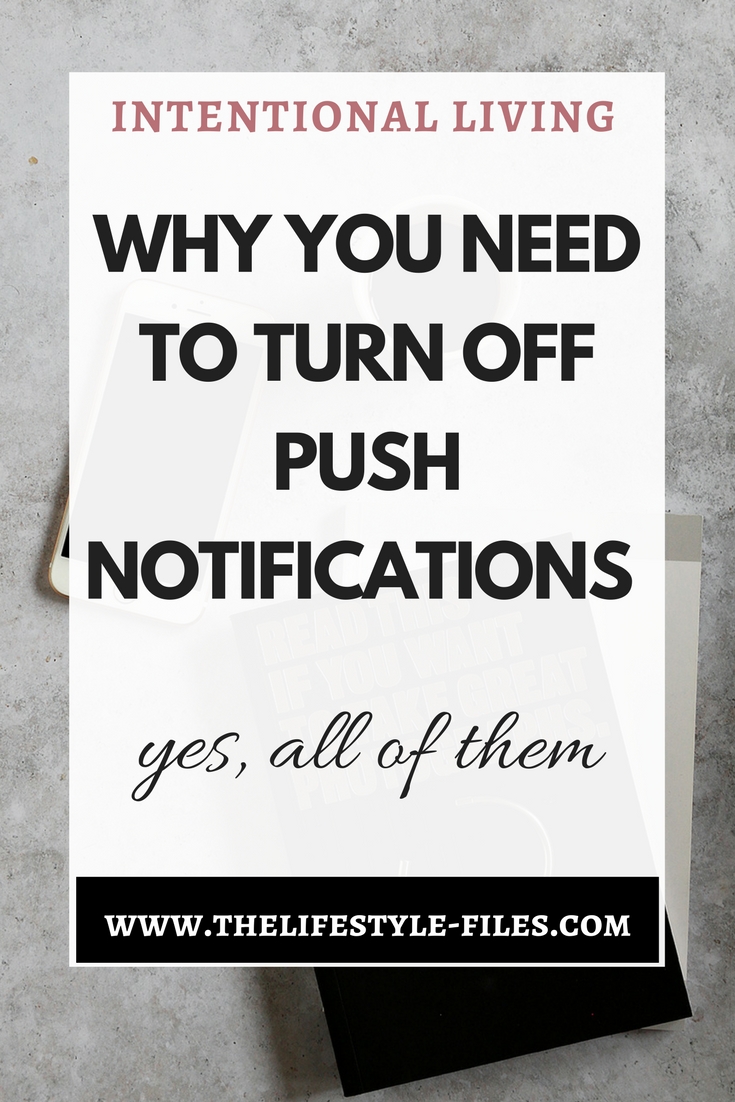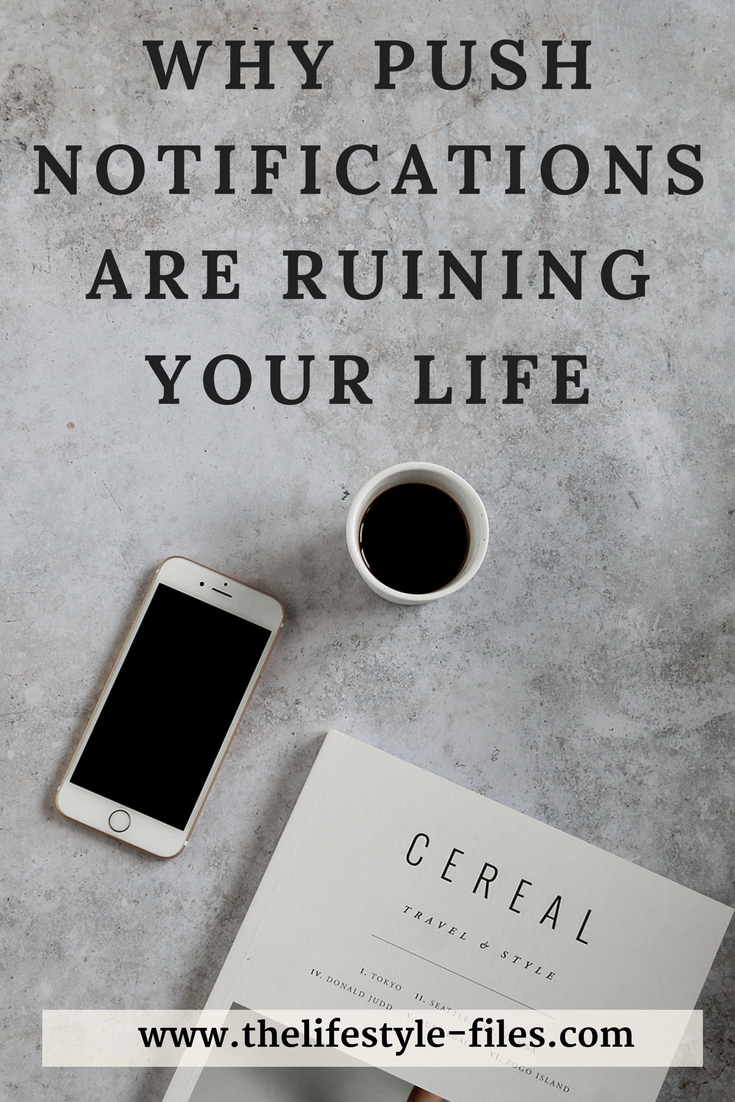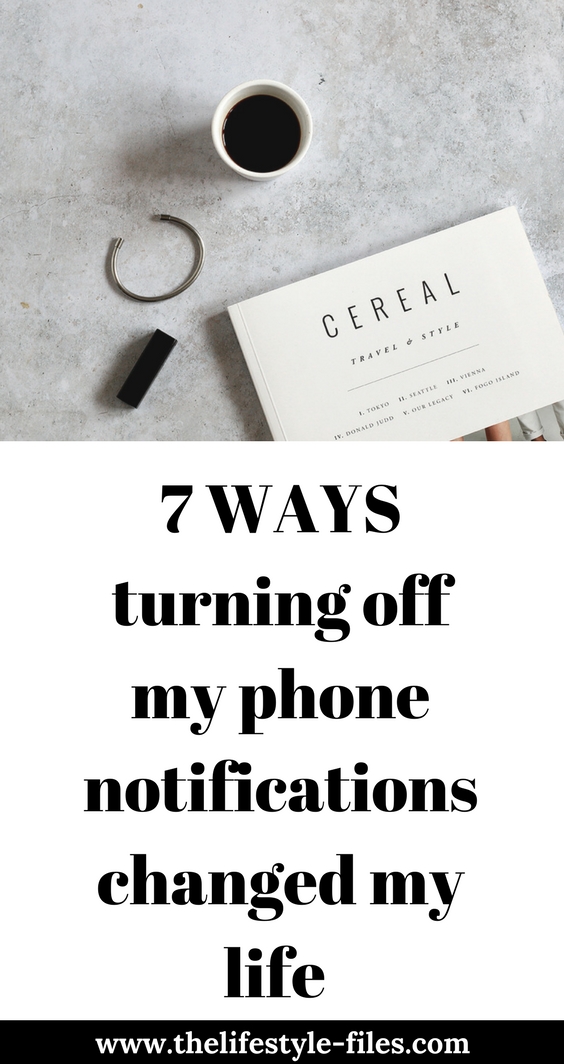
In recent years, so many people have rung the alarm for our excessive addiction to and dependence on our smartphones that it’s starting to become an empty cliché. Which is sad, because there’s a lot of truth to those statements. The next time you’re in a café or restaurant, just look around and count how many people are on their phones as opposed to focusing intently or exclusively on each other.
Often, the first thing we reach after we wake up is that damn smartphone. It’s right next to us when we work, eat, read, talk, or watch TV. A thin, invisible, yet very strong thread has connected it to our hands and to our minds.
Some people manage to maintain a healthy balance, some are more affected and struggling (without maybe even realizing).
I’ve been trying to move from this latter camp to the first one.
Decluttering my social media feeds was the first step. Turning off the phone notifications was a natural follow up.
Generation Notification Addicts
In a way, I think I’m lucky that I didn’t grow up surrounded by smartphones, social media channels, and thus notifications. When Facebook became available to everyone in the world, I already started university. Honestly, I can only half imagine what it’s like to spend your vulnerable teenage years in the shadow of this constant social media craze. That doesn’t mean I, or my generation, is not affected at all. In fact, it’s quite frightening how fast we, who have been perfectly fine without apps, Instagram, Facebook, or Twitter have accustomed to this new reality.
The Generation Notification Addicts is not simply an age cohort, at least not anymore. Anyone, who has started to regularly use social media, apps, and emails are slowly but surely falling into this group, only maybe with a different level of addiction. And it can be quite difficult to escape.
So, are notifications really that bad, after all?
The question is logical: is this issue really so bad as some people make it out to be? After all, notifications are just tiny messages, a quick vibration or beep, nothing major. One can argue that they can even be important: we get breaking news instantly or various work-related tasks or issues that we have to take care of immediately. We are afraid to log off because we constantly worry that we miss something important.
But the thing is if we really examine the content of the notifications, we realize (or at least I did) that most of that information that push notifications dump on us are, well, not important at all. And while 9 out of 10 times, they turn out to be less than breaking news or urgent family or work matters, 10 out of 10 times they disrupt what we are doing.
The term “push notifications” itself signifies the real issue and problem at heart – we don’t choose them (or pull them with a conscious choice), they are forced onto us (pushed) whether we want them or not.
I reached my breaking point with notifications when Instagram for some reason felt it was necessary to inform me that someone else had commented on a post I’ve liked or commented on myself before.
It was total nonsense. I was not the one getting the comments, so why would I be interested in that? It was truly the last straw and I got down to reexamine my relationship with notifications and whether I truly needed them in my life.
After some soul-searching, these were my issues with notifications:
- I was not the one in control. I didn’t just look at my phone when I wanted to, but every single time someone else dumped something into my social media backyard.
- It was terribly distracting – I’ve been in a constant fight for more time in my day while wasting a lot of that on useless social media scrolling.
- I couldn’t focus on my own things because I was often drawn into someone’s life.
- The instant gratification factor got too strong. I caught myself caring about likes and comments way too much and I didn’t like that feeling. Sure, we all crave some feedback, but when a drop in interaction results in you doubting yourself or feeling shit, it’s totally not worth it.
Of course, these are not unique experiences. More and more people are trying to assess and understand how notifications affect our brain. The consensus is that increased smartphone use of course greatly damages our ability to focus and be productive and sends us constantly on a seeker loop – we seek information, breaking news, and instant gratification from likes, comments, and immediate responses.
But would we really like to make our happiness dependent on outside factors, totally out of our control and honestly, with no real consequence to our lives?
I guess the answer would be no.

6 tips to easily say NO to notifications
1// Start with turning off notifications from apps that really do not provide any value, like games or photo apps – weed out everything unimportant.
2// Follow up with stopping notifications from apps that might be of interest to you, but do not affect you personally, like podcasts or YouTube. You can always go and check whether your favorites have a new download or video when you have the time – totally no need to be notified on the spot.
3// Mute your notifications – all the time or at least when you need to focus.
4// Go from easy to difficult, if you’d like – as a starting point I turned off all my Pinterest notifications because it was the easiest. Then work from that.
5// Draw a line – decide which apps are really worth it and which ones fall into the quite worthless category in this regard. For the time, I kept my work email, my Strides (I really need constant reminders to drink water) and Viber notifications, but let go of everything else.
6// Then, disable all the other app notifications. Interestingly, in the first couple of days, you might find yourself checking your phone even more often, but that will pass soon, I promise. After a couple of days, I simply forgot to check my channels or feeds.

So, did it really make any difference in my life?
I’m happy to report that yes, it did.
+ Once again, I really feel like I’m in control of my time and attention. I check my social media feed or news channels when I want to. I spend time on Instagram when I feel like it.
+ I have a lot more and a lot longer productive sessions than before.
+ I also feel more distant and less affected by the inevitable social media comparison trap, probably because I spend less time there. I often simply forget about social media, which I regard as a quite positive thing.
+ I’m also more focused and mindful of how I spend my time when I go online or social channels. I go up when I want to post something or want to engage. Of course, that doesn’t mean that I don’t check out Twitter a couple of times without purpose, but it’s significantly reduced.
+ I went from being a reactive phone user to a more deliberate one.
+ I also realized that if something is really urgent, people will make an effort, i.e. most often call.
+ But most importantly, by turning off most notifications my whole mindset shifted. I no longer jump on these as if my life depended on it. I learned how to decide in a split second, whether I need to stop what I’m doing and turn my attention to my phone. Just mantra this: most messages can wait.
I really can only recommend saying no the notification trap and take back that control. You won’t be sorry.







Because I recently found your blog I’m kind of obsessed with the topics you’re discussing!
I’ve noticed lately that my phone goes OFF all day long because of my notification settings – mostly the news app. With all of the horrible news that tends to make the headlines I didn’t want that constantly bombarding me. I like your application of starting small and eventually working towards turning most unnecessary notifications off. And glad to see it’s working for you!
It’s definitely working and was probably better this way than going all in and shutting down everything at once. And I know what you mean, I get breaking news on my email as well, it sure can be upsetting!